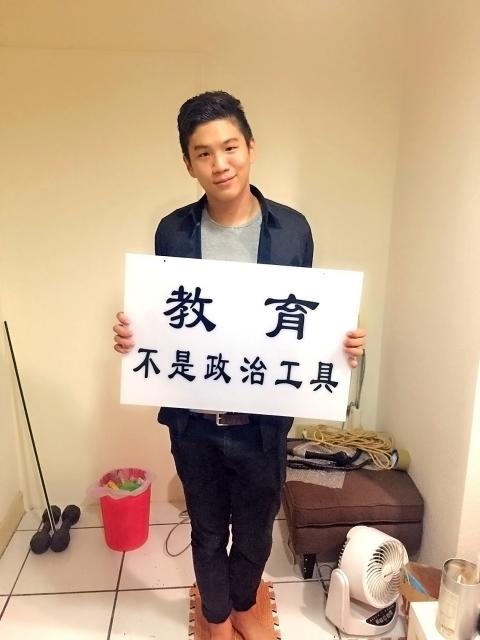As the nation reels from the news that student activist Dai Lin (林冠華) has taken his own life, an interview with the Chinese-language Liberty Times (the Taipei Times’ sister paper) showed the pressure he was under due to his participation in protests against the government’s planned changes to high-school student curriculum guidelines.
Lin was one of 33 people arrested on Thursday night last week for entering the Ministry of Education building and was facing possible prosecution along with 23 other activists.
During a telephone interview on Sunday — two days after his release on bail — Lin said that the principal of New Taipei City’s Juang Jing Vocational High School had visited him hours earlier to discuss his involvement in the demonstration.

Facebook screen grab
“The principal started off by asking me what I really wanted and if there were any messages I needed him to help me convey,” said Lin, who had applied for leave from the school to devote more time to the protests.
The 20-year-old said the principal asked him a lot of questions such as: “Did I know what I was doing? Had I thought this through? Had I fulfilled my duty [as a student]? Had I thought about my future and whether I would still be able to find a job after the arrest.”
Lin said he told the principal he had taken all those things into consideration before joining the protest against the opaque changes to the curriculum and that what had saddened the students the most was seeing their own teachers and principals dismissing their efforts out of hand.
“I think the principal achieved what he intended. After our talk, he went to speak to my mother downstairs for about 10 minutes. All of a sudden, my parents, who had never spoken against my participation said: ‘Who are you to fight this cause? Don’t be too full of yourself,’” Lin said.
“Their words made me disappointed in myself,” he added.
Asked if other student protesters had also been talked to by their schools’ authorities, Lin said the movement would not take any action if his was an isolated case, but that protesters would make their objections known if they ever discovered the Ministry of Education was behind a campaign of intimidation.
Lin said student movements were not frivolous activities because participants often had to undergo questioning from authorities and their characters can be attacked.
“I sincerely hope that parents and school authorities take the time to understand why students are fighting for this cause despite all the pressure we are under. Do not just tell us that the curriculum will no longer be our problem after we graduate and go to college,” he said.
Lin said that many authority figures show no understanding or empathy with the movement’s efforts.
“Maybe the schools are under pressure [from the ministry] or our movement has caused them too much inconvenience. Either way, they should not have questioned or dismissed our motives,” he said.

An essay competition jointly organized by a local writing society and a publisher affiliated with the Chinese Communist Party (CCP) might have contravened the Act Governing Relations Between the People of the Taiwan Area and the Mainland Area (臺灣地區與大陸地區人民關係條例), the Mainland Affairs Council (MAC) said on Thursday. “In this case, the partner organization is clearly an agency under the CCP’s Fujian Provincial Committee,” MAC Deputy Minister and spokesperson Liang Wen-chieh (梁文傑) said at a news briefing in Taipei. “It also involves bringing Taiwanese students to China with all-expenses-paid arrangements to attend award ceremonies and camps,” Liang said. Those two “characteristics” are typically sufficient

A magnitude 5.9 earthquake that struck about 33km off the coast of Hualien City was the "main shock" in a series of quakes in the area, with aftershocks expected over the next three days, the Central Weather Administration (CWA) said yesterday. Prior to the magnitude 5.9 quake shaking most of Taiwan at 6:53pm yesterday, six other earthquakes stronger than a magnitude of 4, starting with a magnitude 5.5 quake at 6:09pm, occurred in the area. CWA Seismological Center Director Wu Chien-fu (吳健富) confirmed that the quakes were all part of the same series and that the magnitude 5.5 temblor was

The brilliant blue waters, thick foliage and bucolic atmosphere on this seemingly idyllic archipelago deep in the Pacific Ocean belie the key role it now plays in a titanic geopolitical struggle. Palau is again on the front line as China, and the US and its allies prepare their forces in an intensifying contest for control over the Asia-Pacific region. The democratic nation of just 17,000 people hosts US-controlled airstrips and soon-to-be-completed radar installations that the US military describes as “critical” to monitoring vast swathes of water and airspace. It is also a key piece of the second island chain, a string of

The Central Weather Administration has issued a heat alert for southeastern Taiwan, warning of temperatures as high as 36°C today, while alerting some coastal areas of strong winds later in the day. Kaohsiung’s Neimen District (內門) and Pingtung County’s Neipu Township (內埔) are under an orange heat alert, which warns of temperatures as high as 36°C for three consecutive days, the CWA said, citing southwest winds. The heat would also extend to Tainan’s Nansi (楠西) and Yujing (玉井) districts, as well as Pingtung’s Gaoshu (高樹), Yanpu (鹽埔) and Majia (瑪家) townships, it said, forecasting highs of up to 36°C in those areas